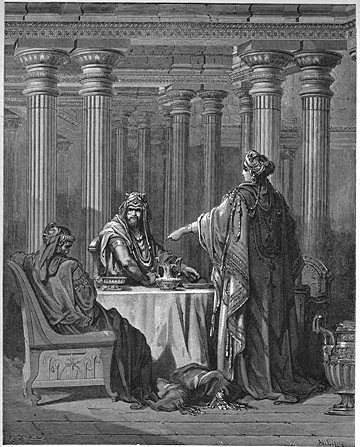Ester 7
1 Ale Haman kple Fia Ahasuerus va kplɔ̃ si Ester ɖo la ŋu.
So the king and Aman went in to drink with the queen.
2 Fia la gabia Ester esi wonɔ wain nom la be, “Nu kae nèdi be yeabia, Fianyɔnu Ester? Nu ka nèdi? Nu sia nu si wòanye la, matsɔe na wò, ne anye nye fiaɖuƒe la ƒe afãe gɔ̃ hã la, mana wò!”
And the king said to Esther at the banquet on the second day, What is it, queen Esther? and what [is] thy request, and what [is] thy petition? and it shall be [done] for thee, to the half of my kingdom.
3 Fianyɔnu Ester ɖo eŋu azɔ be, “Nenye be nye nu nyo ŋuwò, O! Fia bubutɔ, ne edze ŋuwò la, ɖe nye agbe. Esiae nye nye kukuɖeɖe, eye nàve nye amewo, Yudatɔwo hã nu. Esiae nye nye biabia,
And she answered and said, If I have found favour in the sight of the king, let [my] life be granted to my petition, and my people to my request.
4 elabena wotsɔ nye kple nye amewo dzra be woagbã mi, woawu mí, eye woatsrɔ̃ mi, gake ne woadzra mí míazu kluviwo kple kosiviwo ɖeɖe ko la, anye ne mazi ɖoɖoe, gake nunana si ŋugbe futɔ la do la, made nu gbogbo siwo fia la abu la nu o.”
For both I and my people are sold for destruction, and pillage, and slavery; [both] we and our children for bondmen and bondwomen: and I consented not to it, for the slanderer [is] not worthy of the king’s palace.
5 Fia Ahasuerus bia Fiasrɔ̃ Ester be, “Ame kae? Afi ka ŋutsu si dɔ eɖokui be yeawɔ nu sia la le?”
And the king said, Who [is] this that has dared to do this thing?
6 Ester ɖo eŋu be, “Míaƒe futɔ kple ketɔ lae nye Haman vɔ̃ɖi sia.” Tete vɔvɔ̃ na Haman ɖi vo, eye eƒe mo da tu le fia la kple fiasrɔ̃ la ƒe ŋkume.
And Esther said, The adversary [is] Aman, this wicked man. Then Aman was troubled before the king and the queen.
7 Fia la tsi tsitre enumake kple dziku le eƒe wain gbɔ, eye wòyi fiasã la ƒe abɔ me. Esi Haman kpɔ be fia la ɖo nugbe ɖe ye ŋu xoxo la, etsi kplɔ̃a ŋu be yeaɖe kuku na Fiasrɔ̃ Ester ɖe yeƒe agbe ta.
And the king rose up from the banquet to go into the garden: and Aman began to intreat the queen; for he saw that he was in an evil case.
8 Esi fia la trɔ gbɔ tso fiasã la ƒe abɔ me hege ɖe kplɔ̃ɖoƒe la ko la, ekpɔ Haman wòmu dze Fiasrɔ̃ Ester dzi le zikpui legbe si dzi wòdze ŋe ɖo la dzi. Fia la blu be, “Aa! Ɖe wòle asi de ge fiasrɔ̃ la ŋu esi wòli kplim le nye aƒe mea?” Fia la mekpɔ wu nuƒo la nu hafi wova tsɔ nu tsyɔ mo na Haman o.
And the king returned from the garden; and Aman had fallen upon the bed, intreating the queen. And the king said, Wilt thou even force [my] wife in my house? And when Aman heard it, he changed countenance.
9 Harbona, fia la ƒe subɔlawo dometɔ ɖeka gblɔ be, “Fia bubutɔ, Haman na wotu kadeveti aɖe si kɔ mita blaeve-vɔ-etɔ̃ la ɖe Mordekai, ame si ɖe fia la ƒe agbe la ŋu, ele Haman ƒe aƒe ƒe xɔxɔnu.” Fia la ɖe gbe be, “Mide ka ve na Haman ɖe kadeveti la ŋu!”
And Bugathan, one of the chamberlains, said to the king, Behold, Aman has also prepared a gallows for Mardochæus, who spoke concerning the king, and a gallows of fifty cubits high has been set up in the premises of Aman. And the king said, Let him be hanged thereon.
10 Ale wode ka ve nɛ ɖe kadeveti si wòtu na Mordekai la ŋu, eye fia la ƒe dziku nu fa.
So Aman was hanged on the gallows that had been prepared for Mardochæus: and then the king’s wrath was appeased.





















